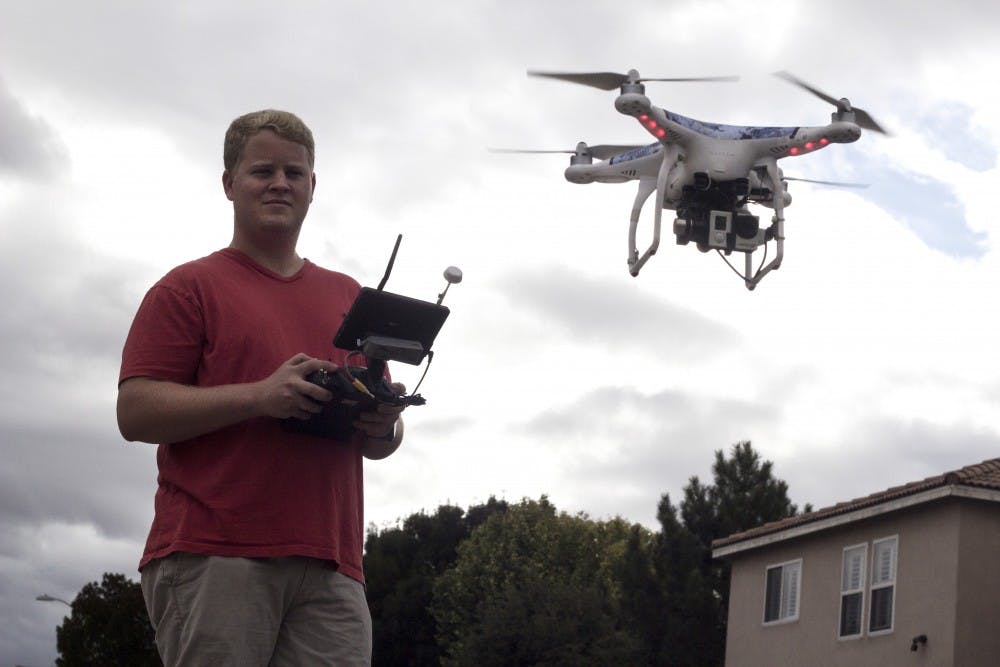Talk of drones can conjure concerns about privacy, safety and ethics for many, but one man has a different worry.Talk of drones can conjure concerns about privacy, safety and ethics for many, but one man has a different worry. He wants protection for himself while controlling any of his personal unmanned aerial vehicles.
Paul Aitken uses his drones to take photos and videos, a practice that is at the intersection of new technology and privacy laws. He needed a solution that would protect him from lawsuits by ensuring that he wasn’t taking footage of people without their consent, he said.
“Most people are worried about drones ruining their privacy. They think that they are weaponized, unmanned vehicles,” Aitken said. “Drones bring perspective. It’s a new style.”
In order to prevent such problems, Aitken teamed up with Jason Bache of Nerds Limited, a local electronics shop, to come up with an application called “Legal Flyer.” The app is meant to ensure people in commercial footage are aware they are being recorded in addition to preventing lawsuits. Bache created “Legal Flyer” under Aitken’s ownership.
“‘Legal Flyer’ is the easy and convenient way for pilots to obtain flight permission and property releases all from the iPad,” Aitken said. “It is illegal to take footage of people on their property or in their homes without their permission.”
The two work with real estate companies, using their drones to take photos and video of properties from a unique perspective that is otherwise hard to achieve. Although the team has permission to take footage of a particular house, they must get permission from neighbors in case footage of their properties was to slip in.
After speaking at the National Association of Broadcasters show in Las Vegas, Aitken said that he needed to ensure that his method of recording video and photos was protected from a legal standpoint.
“We realized that there was going to be a problem with flight releases and property releases,” Aitken said. “Getting each and every individual involved to sign a release is a nightmare, which is why we created the app.”
Bache said that “Legal Flyer” was particularly designed with the explicit intent of creating something that the two would use regularly.
“Everything was carefully thought out for this particular app that Paul and I would use,” Bache said. “It is designed for cinematographers to integrate very quickly into the Hollywood workflow.”
Following the law is vital for the two entrepreneur’s success when filming and shooting commercially. Bache said that covering every inch of the law is something that the two want to abide by.
For more than two years, Aitken said he has been piloting his drones in the sky, recording public events like tailgates, lake trips and even pumpkin carvings. Aitken was the first to be approved by the Federal Aviation Administration to use drones to record an air show, he said. He was also the first to record a city marathon using drones approved by the FAA in Pittsburgh.
Get content from The Daily Lobo delivered to your inbox
Being in a public place gives Aitken a pass when piloting his UAVs, or unmanned aerial vehicles. But there is room for error when unwanted photos or videos are taken on private property, even if the footage was taken accidentally.
According to privacy laws, flying or extending a camera onto private property is considered trespassing and subject to legal action.
State statutes have five categories that are in place to prohibit certain types of invasion of property. Two of those categories can be accidentally triggered without any malicious intent with the new capabilities of drones.
The “intrusion upon seclusion” statute states that invading an individual’s private affairs such as home or private property is illegal. Without intent, drones are naturally above walls and fences that are not generally accessible by foot photographers. The statute also says that the materials don’t have to be published to be considered as trespassing — simply gathering the footage is considered illegal activity.
Another statute involving invasion of privacy that can be potential trouble is when commercial publication exploits an individual using photos, a name, voice, or other personal attributes without the individual’s consent.
Bache and Aitken said “Legal Flyer” protects them from every problem they could think of “and then some,” allowing them to continue to take photos and video in the air as long as the individuals involved give permission through the application.
“We can’t enforce the laws,” Bache said. “But we can make it easier.”
Liam Cary-Eaves is a sports reporter for the Daily Lobo. He can be reached at sports@dailylobo.com or on Twitter @Liam_CE.






